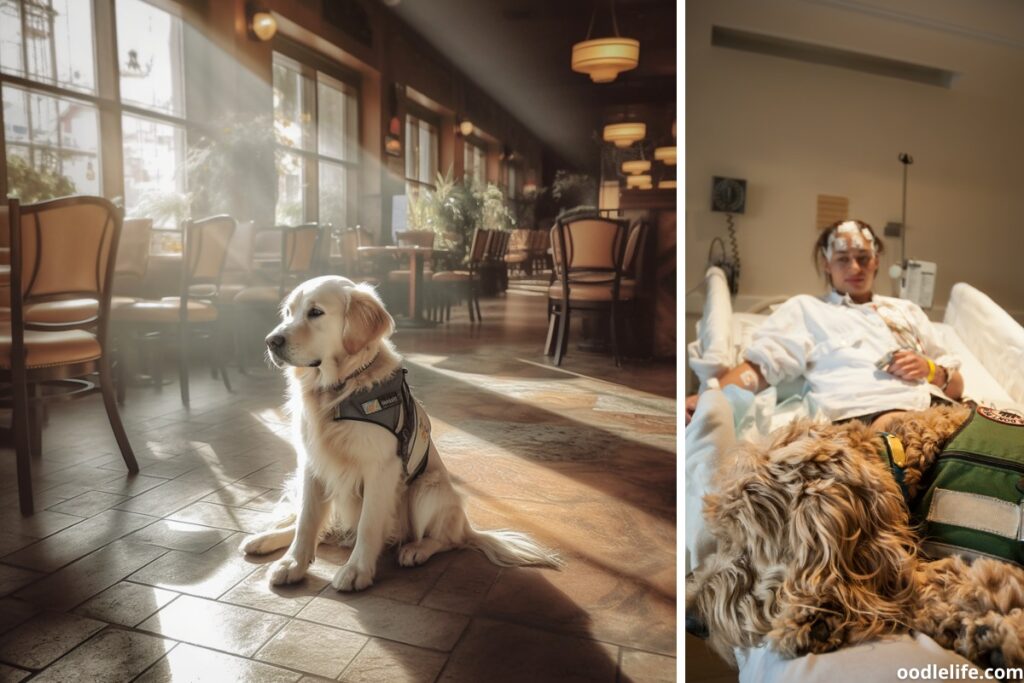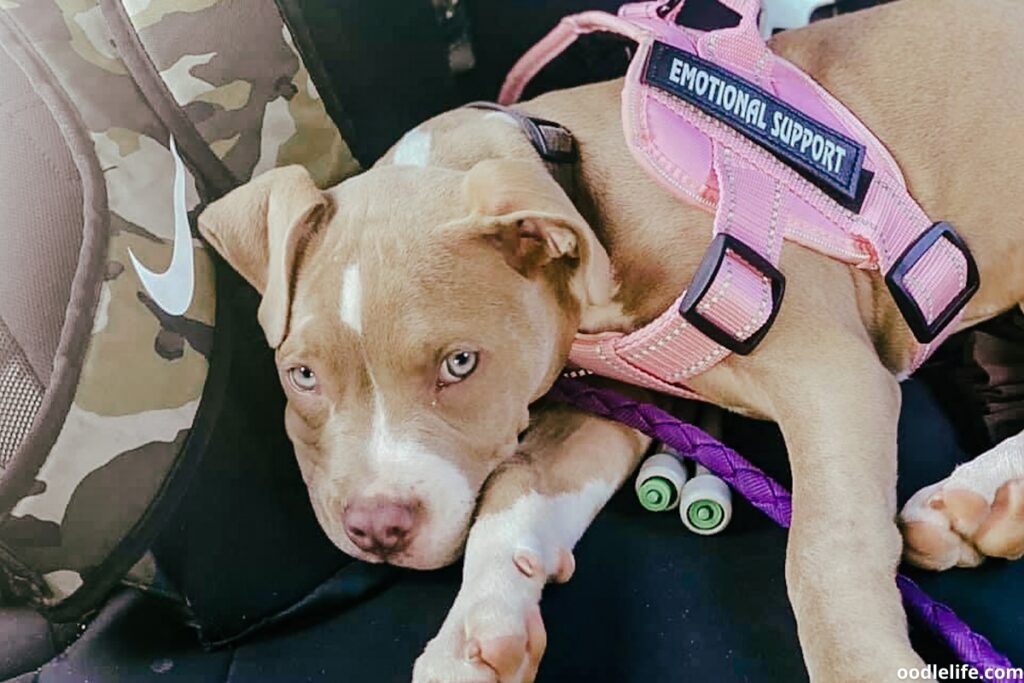Dog Wakes Woman with Narcolepsy: Canine’s Lifesaving Role
Narcolepsy is a neurological disorder that affects a person’s ability to control their sleep-wake cycle, leading to sudden sleep attacks and overwhelming daytime sleepiness.
For those suffering from this condition, their daily lives can be heavily impacted, making it difficult to perform even the simplest of tasks. However, some narcoleptic individuals have found a unique solution – a specially trained service dog.

One inspiring story is about a Belgian woman named Annick, who suffers from severe narcolepsy, experiencing multiple sleep attacks every day. Her life was transformed when she received assistance from a dog named Idefix. This remarkable mixed-breed canine was trained to wake Annick whenever she experienced a sleep attack, by nipping at her ankles or ears. With Idefix’s help, Annick regained control of her life, proving the incredible potential of service dogs in assisting those with narcolepsy.
Service Dogs for Narcolepsy
Roles and Responsibilities
Service dogs can be a life-changing support system for people with narcolepsy, as they are specifically trained to help with symptoms and everyday tasks. A narcolepsy service dog can warn the person when a narcoleptic episode is about to happen, and assist in keeping them safe by nudging, licking, or barking. After an episode occurs, these loyal companions can even wake the person up and fetch necessary medications or items.
Training and Certification
Narcolepsy service dogs go through rigorous training to ensure they can provide the necessary assistance. They are taught specific skills that cater to their handler’s needs and condition, such as sensing narcoleptic episodes, alerting, and even fetching items. Service dogs and their trainers typically need to complete a certification process to verify their skills, making sure they are competent and capable of providing effective support.
Breeds Commonly Used
Not all dog breeds are suitable for the role of a narcolepsy service dog. Some of the most popular choices include Labrador Retrievers, Golden Retrievers, and German Shepherds. These breeds boast qualities such as high intelligence, adaptability to various situations, and their eagerness to please and learn. An example of a service dog assisting a narcoleptic handler is Idefix, who helps a Belgian woman named Annick and has been a game-changer in her life.

Selecting the right dog, training, and supporting individuals with narcolepsy requires a unique skillset. It’s essential to consider the individual’s particular needs and preferences when matching them with a service dog. Ultimately, a well-trained narcolepsy service dog can offer invaluable companionship and assistance, making day-to-day life significantly more manageable for those living with this condition.
Living with Narcolepsy and a Service Dog
Promoting Independence and Support
Living with narcolepsy can be challenging, but having a service dog by your side can make a world of difference. These loyal companions can help promote independence by assisting their owners in managing their neurological condition. For example, they can warn you of an episode before it happens and wake you up afterward. This support can be invaluable in helping people with narcolepsy feel more secure when navigating their daily lives.
PuppySpot is a reputable dog marketplace where you can browse and find compatible puppies right from the comfort of your home. They have placed over 200,000 puppies into homes in the US!
Service dogs can also offer emotional support and help ease anxiety, which can be an additional concern for those living with narcolepsy. By providing a sense of stability and companionship, these furry friends can make everyday tasks less daunting and much more manageable.

Daily Routines and Care
One essential aspect of living with a service dog for narcolepsy is establishing a daily routine. This might include regular morning exercise, such as walks or light jogging, which can be beneficial for both the dog and the owner. Additionally, service dogs can assist with routine tasks like cooking, ensuring their owner stays safe while preparing meals.
Taking care of a service dog also means regular grooming and feeding, as well as administering any necessary medications. Although caring for a service dog can take time, the support they offer far outweighs the efforts required to maintain their well-being.
Navigating Public Spaces
With public spaces often bustling with activity, navigating them as a narcoleptic individual can be challenging. Thankfully, service dogs are specially trained to guide their owners through these environments safely. Whether it’s running errands in the city, attending appointments, or meeting friends, service dogs enable their handlers to participate in daily activities with greater confidence.
It’s also important to know that, under the Americans with Disabilities Act (ADA), service animals are allowed in any public space where their owner is permitted. This provides an additional layer of security and support for those living with narcolepsy.
Legal Rights and Protections
The Americans with Disabilities Act (ADA) offers considerable protections and rights for individuals with narcolepsy who depend on service dogs. The ADA clearly states that people with disabilities, including those with narcolepsy, are allowed to bring their service animals into public spaces, without being charged any additional fees. This means that individuals with service dogs have the legal right to enjoy public places without facing unnecessary difficulties.
In conclusion, a service dog’s unwavering companionship and assistance play a crucial role in making the lives of people with narcolepsy easier, promoting independence and support. By establishing daily routines and care, navigating crowded public spaces, and being aware of legal rights and protections, individuals living with narcolepsy can lead fulfilling and independent lives with their trusted service dogs by their side.
Real-Life Stories of Narcoleptic Service Dogs

Idefix and the Woman from La Louvière
In Belgium, a woman named Annick found herself struggling with severe narcolepsy, a sleep disorder that causes sudden and uncontrollable episodes of sleep. Lucky for her, a 5-year-old mongrel named Idefix had been trained to awaken her whenever she nodded off. This rescue dog became an indispensable part of her life, nipping her when she starts to doze off, allowing her to go about her daily activities safely.
Annick received Idefix’s help after connecting with a Belgian organization called Coeur à Coeur that trains service dogs. Before Idefix’s arrival, Annick suffered from hallucinations, sleep paralysis, and frequent collapses, making it challenging for her to move around or attend courses for her undergraduate degree. Tivoli Hospital provided her stimulant medications, but the real game-changer was Idefix.
Emergency Support and Public Awareness
Narcoleptic service dogs, like Idefix, play an essential role not only in helping their owners avoid potential hazards but also in supporting them during emergencies. They offer companionship, assistance, and confidence to individuals who need it most.
Alongside more commonly known support animals for the visually impaired, narcoleptic service dogs contribute significantly to public awareness of other conditions, such as epilepsy and sleep paralysis. They become advocates for people with challenges that might otherwise go unnoticed or misunderstood.

As dog parks increasingly become social hubs for canines and their human counterparts, narcoleptic service dogs can spark essential conversations on sleep disorders, parental supervision, and the unique roles dogs can fulfill as helping hands (or paws) in various situations.
From assisting during sudden sleep attacks to providing an extra “leash” on life, these amazing animals make a real difference for their owners and communities alike.
Remember, you can teach an old dog new tricks. It just takes a little heart and determination, much like the amazing story of Idefix and the woman from La Louvière.





![What is a Merle Poodle [Explained]](https://poodle.club/wp-content/uploads/2022/12/what-is-a-merle-poodle-768x512.webp)

